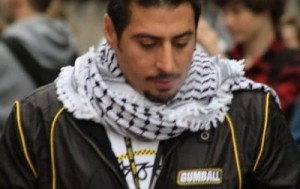War on Syria: To strike, or not to strike
My one and only answer now, tomorrow and forever is NOT TO STRIKE.
I know I’m not Syrian, and that the only ones who should make such a life-changing decision are Syrians, but since there are some Syrians who are calling for the US military strike, and those who are against it, and since almost all nationalities on planet Earth are giving themselves the right to interfere, I thought I’d share my two cents as well.
To be honest I’m in such a shock to hear that some people are actually pro the war on Syria! But then I look more carefully and see that most of them are living outside Syria, encouraging war and justifying their stand with: “it’s a strike on the government, the corrupt regime, on Assad, and not on Syria.”
Nothing good ever comes from war. War = violence, and violence is terror, you can’t eliminate terror with terror, it will only make things worse. And if the war on Iraq, Afghanistan or elsewhere did ever result in something other than more destruction and more loss of innocent lives, then this war on Syria would.
First it was boycott and now a military strike; decision-makers seem to turn a blind eye to the fact that the only ones who are paying the high price are the innocent Syrians. Since the Syrian revolution started, it’s always been them. And I don’t see how a military strike will improve things for them!
Obama said, this military strike is to ensure a violence-free, and a safe world for our children. The same children we teach every single day not to bully, and to never encourage violence no matter what. The same children we preach about the importance of peace, and how authority and power can never serve humanity without responsibility. While decision-makers are arguing what lesson they should be teaching dictators (who, as proven by history never hesitate to destroy everything till they get what they want, even if it meant having all their people bombarded and burnt to the bone), why don’t decision-makers focus on teaching their people how not to raise dictators and violence-thirsty generations. Why is it so easy to launch a missile, wage a war, but so hard to save lives and maintain peace?
I’m not a politician, nor a decision-maker, but I don’t see any reason why all these people and governments who are sparing no effort to support a war on Assad (which is just a way to paraphrase ‘war on Syria’), can’t all come together and unite, pay the same effort to get in there and protect Syrians until matters are solved. All I see are people looking from a far and safe distance, judging, condemning and supporting chaos, financially, how about a planned support targeting only who needs to be targeted, saving the real victims?
So please people, don’t go calling for a military strike, it’s not a ride to enjoy, it’s not something you do for fun, this is an expensive action, I couldn’t care less about the financial angle (although come to think of it, the money to be spent on war is better spent on feeding the poor and saving starving nations), what I meant is the lives that will be lost in the middle of this nonsense. Not to mention the side-effects that neighboring countries will be suffering from.
So, yes, I say Hands Off Syria. There must be an other way to solve this.

 Das Programm der
Das Programm der 

